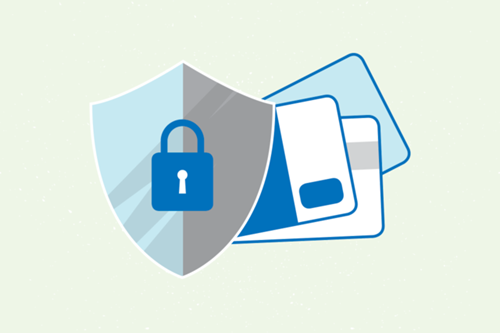You likely have a basic understanding of fraud and the significant impact it can have. But here's an eye opening stat: 1 in 5 respondents to the CPA Canada's 2019 Annual Fraud Study reported they've been the victim of credit card fraud.
The reality of the ongoing battle against fraud—especially credit card fraud— is that it's here to stay. But, if you arm yourself with the right defenses (education and knowledge of current scams), you're less likely to become a victim.
Tips to avoid credit card fraud
If you're new to credit cards, or just don't know the basic ways to protect yourself yet, you've come to the right place! If you're already well versed in the basics, we've also included some current scams to watch out for.
1. Protect your card and PIN
Take care of your credit card like you would your passport. Would you leave your passport on the dash of your car for everyone to see? Be diligent in keeping your wallet (and credit card) on your person when you're out.
Do you use a PIN that's related to your birthday, your kid's birthday or your phone number? Before you answer this, know that it's a trick question. Make your PIN truly unique and refuse to answer any questions about your PIN (it's okay to keep some secrets in life!).
2. Check your credit card statements
It's always wise to inspect what you expect. Make it a habit to check your statements more than once a month. If you bank with Servus, the Servus Mastercard Fraud Management system now offers SMS message alerts, giving you a more immediate and convenient way of monitoring your account activity. If there’s suspicious activity on your Mastercard account, you’ll receive a text message alerting you.
3. Make your bank a contact
Add your bank's number as a contact in your phone. If you're a Servus member, add 1.844.334.3808 and call us immediately if your Servus Mastercard is lost or stolen. Adding the number to your contacts list can save time when stress levels rise.
4. Evaluate all sources asking for information
If you get a call asking for credit card information, or any personal information for that matter, investigate it. Don't be afraid to hang up on someone who makes this matter urgent—it's not rude, it's safe. Do a search of the company online and see if they're legitimate and credible. A smart practice is to only provide personal information on calls you make.
If your bank calls you requesting information, hang up and call them back at the number they provide on their website. Your current bank has your personal information and won’t call, email or text you to gather or confirm these details.
Common credit card scams
New tactics and scams are constantly appearing. Start searching the web for new scams and increase your awareness of the techniques that scammers are using. The more you know, the more vigilant you'll become. Here are a few of the recent scams we know of:
1. Credit Card Fraud Department Scam
You'll get a call (usually in the morning) from a fraudster claiming to work in the security department of your bank or credit card company. They'll tell you there's been unusual activity on your account, and they'll ask you to confirm details like your Card Verification Value (the 3 digit code on the back of your card) and your address. Here’s the kicker—they'll tell you to call the number on the back of your credit card to verify the validity of the call, but they already have the information needed.
Protect yourself—only provide personal information on calls you make.
2. Interest Rate Reduction Scam
Scammers call with a pre-recorded message saying you qualify for a lower credit card interest rate. They may already know some of your personal information, including your credit card number. They'll ask you to verify things like your Card Verification Value (the 3 digit code on the back of your card) and address.
Don't say anything—just hang up immediately. If this happens to you, report it to your credit card provider.
3. Continuity Billing Scam
Scammers will offer a free trial of a product or ask you to cover shipping—in both cases you're asked to provide your credit card information. A month passes and suddenly you're charged rates you didn't sign up for!
Read the fine print before subscribing and do a quick search of the company to see if they're reliable.
4. Free Wi-Fi Scam
Scammers will set up Wi-Fi networks without a password to entice people in public places who may be looking for a connection. If you connect to any open Wi-Fi, scammers can access the information you send over the network. Protect yourself (and your credit card) by using your secure home Wi-Fi network for all personal transactions. If you do connect to a public Wi-Fi source—while sipping that latte—don't conduct sensitive business.
Pro tip: don't stay permanently signed in to apps on your phone or laptop. Choosing to sign in each time adds a layer of protection if you ever do connect to a shady network.
Credit card scams are just one of the many frauds cyber criminals use. You can stay up to date on current scams and discover new ones as they arise with the Government of Canada's Get Cyber Safe program.


